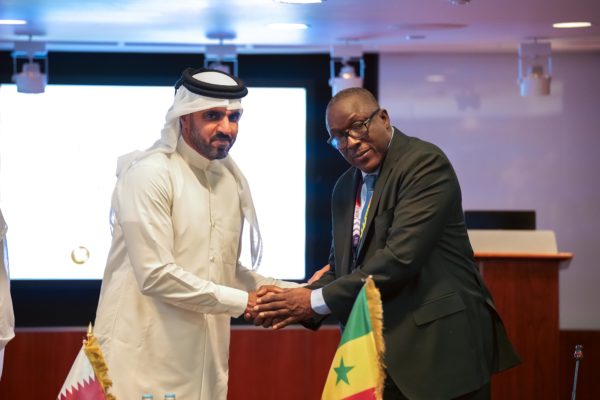Senegal is among four countries benefiting from the signing of new commitments to education projects, which took place at the United Nations fifth Least Developed Countries conference in Doha on Tuesday.
Education Above All (EAA) and the Qatar Fund For Development (QFFD) hosted a roundtable discussion which included ministers from Bangladesh, Liberia, Senegal, Burkina Faso, Pakistan, Nigeria, Malawai and the State of Palestine.
The “Out of School Children – Linking across sectors for Success” aimed to raise awareness and understanding of the importance of sharing best practices, when it comes to providing access to primary education for children in LDCs where EAA has a presence.
The discussion was followed by the official signings of new commitments for EAA projects in Bangladesh, Burkina Faso, Liberia and Senegal.
These new projects will ensure more than 785,060 out-of-school primary children are committed to enrolling in education between now and March 2027.
Speaking at the EAA event Senegal’s Minister for National Education Cheikh Oumar Anne Minister said:
“We have an education system with the public school which receives 75% of our children of school age and 25% are in a parallel system, a system of Arab-Islamic education which dates from two centuries before the European introduction of the French school, which accommodates approximately two million five hundred children.”
“We are in the process of developing a strategy to integrate these schools into the system, with some major constraints where it will be necessary to train teachers, it will be necessary to build infrastructures, to create bridges to be able to pass from one educational system to another.”
“We are a country identical to the other countries of the sub-region, West Africa, sub-Saharan Africa, with a very young population. 50% of the population is under fifteen-years-old. They must be educated. Our demography is galloping. We have doubled our population practically every twenty years. It will be necessary to train teachers, it will be necessary to build infrastructures, it will be necessary to adapt.”
“The Government of Senegal allocates 22% of its resources to the education system, or almost a quarter of the national budget. Most of this budget is absorbed by teachers’ salaries. It’s a system in perpetual crisis because it’s unionised, but we somehow manage to build thousands of new classrooms each year, modernise the parallel system with infrastructure and this year we are starting the recruitment of teachers specialised in this parallel system to put them back into the national education system.”
“We are also working on the introduction of our national languages by 2028. In six years we will be able to generalise teaching in our national languages, in all our schools at least for the primary level, and I think this will be a significant qualitative leap.”
Education Above All and its partner BuildOn2 will continue its work in Senegal on project: Enrol OOSC Project: Break the Cycle of Poverty. The project aims to reach over 24,000 out-of-school children by early 2027 through its work partnering with rural communities to empower local residents to build schools and enrol children. In partnership with Ministries of Education and local communities, previous projects have completed work on the construction of thousands of primary schools already.
Before breaking ground on a new buildOn school, communities also pledged to send the same number of girls to school as boys.
Hosting the discussion Fahad Al-Sulaiti, CEO of Education Above All urged everyone to build on what was agreed at LDC5: “To prepare for the upcoming SDG [Summit] in September 2023, policymakers need to work together to assess existing shortcomings and discover the best way to address them to avoid effects on the global economy”.
Speaking at the event HE Mr. Khalifa Al Kuwari, Director General of Qatar Fund for Development, said the Doha programme of action for these developing countries coincides with the decade of action to deliver the Sustainable Development goals. This is a very critical time for our generation to deliver sustained results on various topics, chief of which is leaving no one behind, especially when it comes to education.
The 46 least developed countries (LDCs) are defined, by the United Nations, as low-income countries facing multiple challenges that prevent them from sustainable growth. The LDCs represent around 880 million people which is 12% of the world’s population. LDC5 aims to achieve a road map to implement the Doha Programme of Action (DPoA) bringing the LDCs together with partners to agree commitments, maintain political momentum and ensure goals are met so that no one is left behind in this decade of action to deliver the SDGs.
The Doha Programme of Action calls for a commitment to “ensure that all girls and boys complete free, equitable, inclusive and quality primary and secondary education, leading to relevant and effective learning outcomes and inclusive, sustainable economic growth.”



